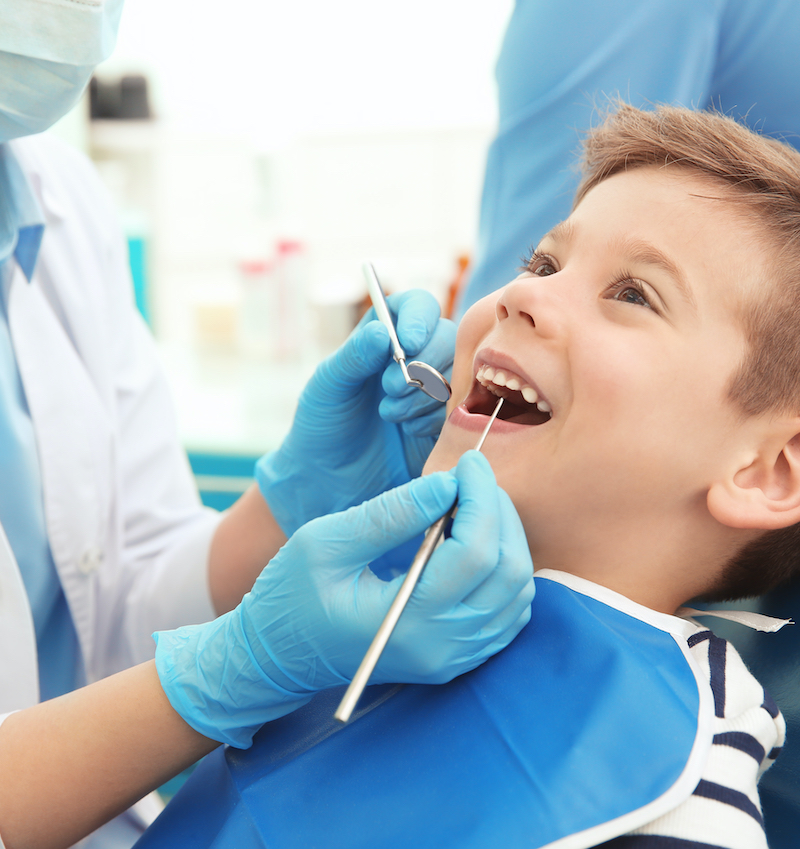Kids!
Latest Techniques
Innovative Tech
Certified Experts
Our Service
At Oquirrh Mountain Dental, we are a family practice where we see patients of ALL ages. Our staff
At What Age Should I Bring My Child In For An Exam?
We believe the answer to this is “the earlier the better”. The American Dental Association recommends a child’s first appointment six months after the eruption of their first primary tooth, which would place the age of the patient about 1 year to 18 months old for their first exam.
Though we may not be able to accomplish as much diagnostic treatment on a 2-year-old as we would a 5-year-old, we believe strongly it is important to have your little one become accustomed to the dentist. Simply sitting in the chair, letting us exam their teeth and becoming comfortable with their new surroundings where they are being examined are important for their future appointments if a problem ever arises.
At What Age Does My Child Need Sealants?
We typically place sealants on permanent molars and premolars. Therefore, we wait until your child is about 6 years
A sealant is a clear plastic resin that is painted on top of the chewing surfaces of these permanent teeth. Because these teeth tend to have deep narrow grooves that are difficult for anyone to clean, let alone a child, it is best to seal them so
This procedure is again performed when your child is about twelve years old. This is the age when the second set of molars have poked through the gums.
.
Are My Child's Teeth All Coming In?
Every child is different in their eruption pattern. A good rule of thumb is the lower two front teeth are the first to erupt right around the age of 6 months. The next rule of thumb is that about 4 teeth erupt every 6 months after that. Also, remember that girls teeth usually come in faster than boys AND all these eruption predictions are based on averages, so your child could easily be ahead or behind the average.
Another good rule of thumb is that teeth usually come in as pairs. Once in a while, you might notice your child has only a single tooth showing through with the other one somewhere behind it. Don’t panic! This is very common and the other tooth will poke through, just give it some time. If a concern still arises, we can examine with an x-ray and make sure that the other tooth is coming in. It’s important to remember that it is very rare for a child to be missing a baby tooth, but a little more common for a child to be missing an adult tooth. We can check for these anomalies and make appropriate treatment decisions if this occurs.
What If My Child Broke a Tooth?
If a broken tooth occurs, which is very common, especially for little crawlers, call us immediately to make an appointment. It is important for us to make sure the tooth has not broken beyond the pulp, or center, of the tooth. Most of the time, a cracked tooth is nothing more than a cosmetic issue and, depending on the age of the child, can be repaired as soon as the child is ready to allow the dentist to repair the tooth. Cosmetics are important for little ones. Having a cute smile is very important for their social growth and interactions at school, church and play.
What Are Some Good Habits To Develop NOW To Prevent Cavities?
The first step is to start when they are at the youngest. Some important do’s and
Don’t put your child to bed with a bottle unless there is nothing in the bottle except water. Juice and milk, although extremely therapeutic for your child, can cause caries almost more rapid than anything else. A term for this condition is called “Baby Bottle Tooth Decay”. Within a short amount of time, and night after night of juice drinking, the teeth will become decayed.
Do brush your child’s gums or teeth before they go to bed, even if they only have two little front teeth. This helps clear bacteria, and of coarse, helps prevents cavities. Most children aren’t too willing to let a parent brush their teeth, but try to be consistent even if you have to hold their hands away. We recommend to do the brushing yourself or at least check their brushing until they are at least 5 or 6 years old. Brushing for kids requires nighttime brushing right before they go to bed and before they have a night snack or drink of juice and morning brushing before they go to school.
Do encourage your child to eat less sugar, staying away from soda (especially popular “energy” drinks popular among teens), reducing intake of high starch and high carb foods and replacing these foods with healthier alternatives such as
Should I Give My Child Flouride?
Community fluoridation has been in effect in the U.S. almost 60 years now with the program to fluoridate community water beginning in 1945. Research has found that this system reduces caries in the community up to 20 to 40%. Even amidst all the latest research and research in the past 60 years that this is safe and effective, there are still communities that do not have fluoridated water. If this is the case, children should receive supplemental fluoride prescribed by their dentist. In the Salt Lake Valley, the water systems are adjusted to about 1.0mg/L of fluoride to water ratio. This is the optimal level.
Children under the age of six months should not receive fluoride or fluoride supplements. Most bottled water and tap water contain fluoride already. If your baby is bottle feeding with formula, it might be a good idea to use non-fluoridated water from the store, which can be purchased for less than $1/ gallon. The ADA also encourages children below six years old to not use fluoride rinses unless specifically prescribed by the dentist.
Just like anything else in life, too much of a good thing can be detrimental. Too much fluoride can cause fluorosis which can result in permanent whitening and browning of the teeth. This condition is rare but still needs to be looked for.
The ADA encourages parents to brush their child’s teeth with non-fluoride toothpaste until they are 2 years old. After this age, it is safe to use fluoride toothpaste, but only less than a pea-size of toothpaste. Try not to let your child swallow the toothpaste, but the reality is that they probably will, so just use a very small amount.
Dental Care for The Whole Family
We look forward to providing you & your family with the dental excellence you deserve.
Adult Care
Child Care
Clear Aligner Treatment
We are A Full Service Dentistry Practice
We’re proud to offer our patients the most advanced and personalized dental care possible. Our dedicated team loves building long-term relationships with patients, earning their trust, and providing excellent care.

Book An Appointment

Book An Appointment

